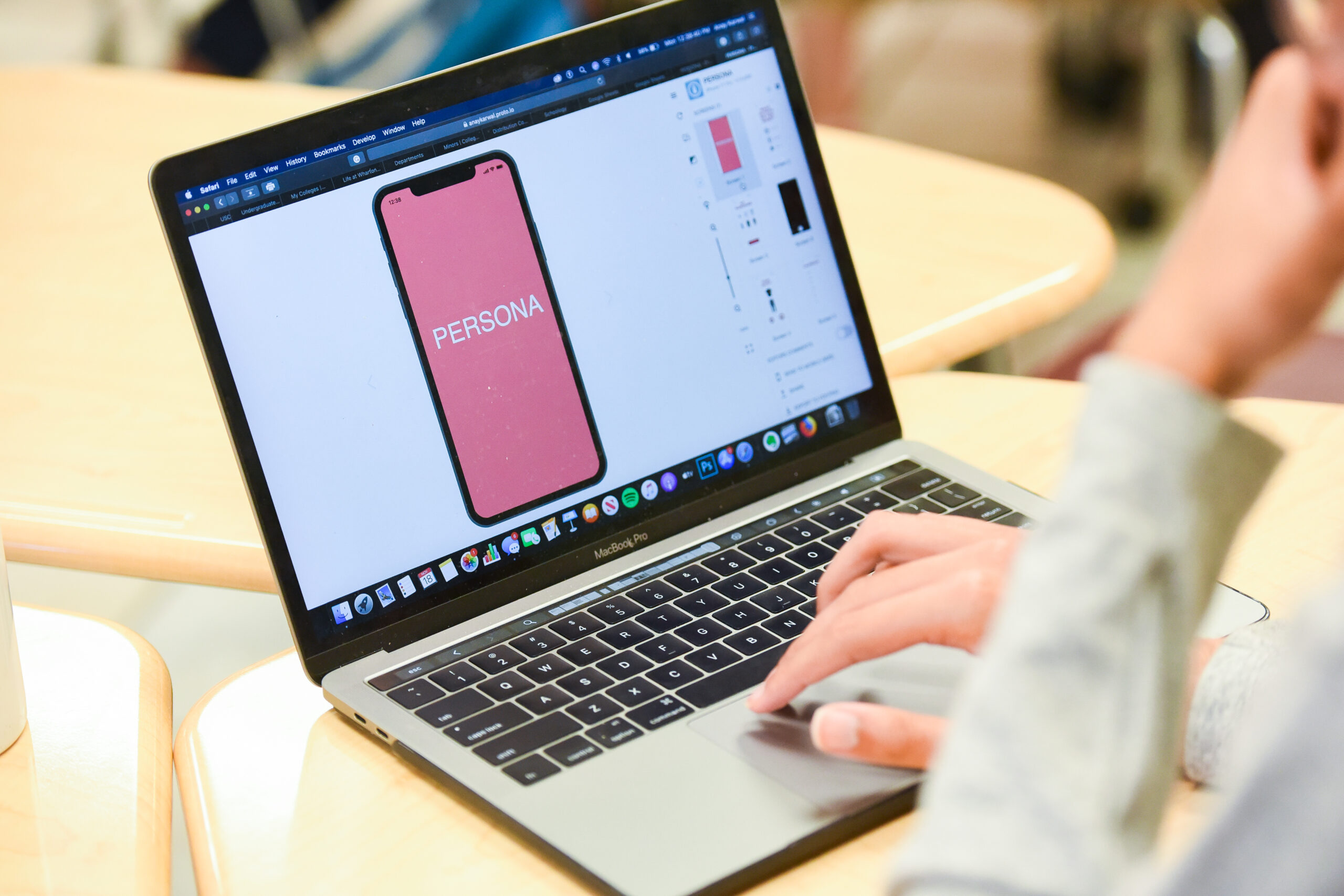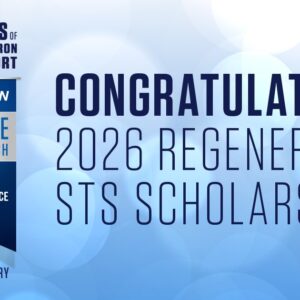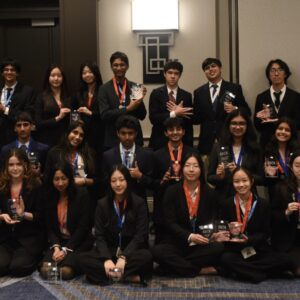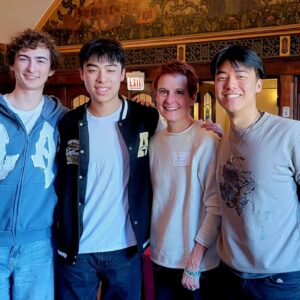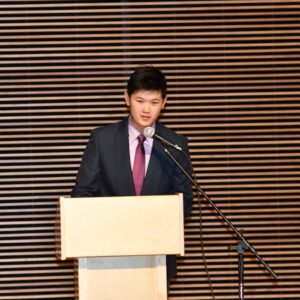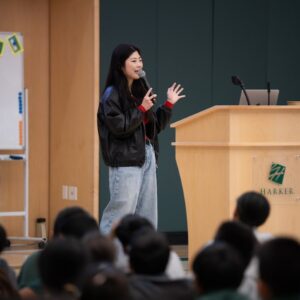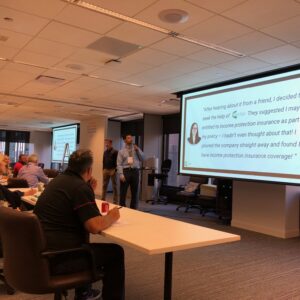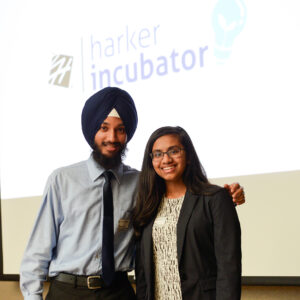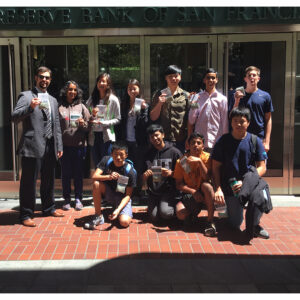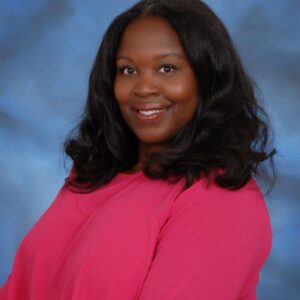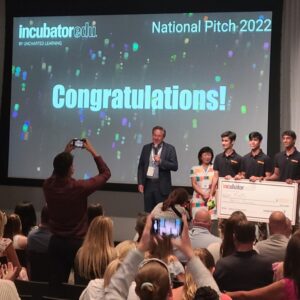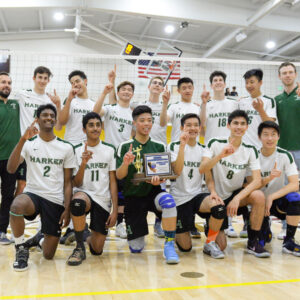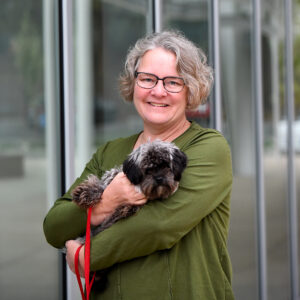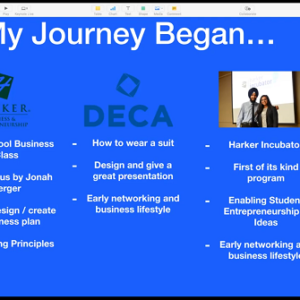This article originally appeared in the winter 2019 issue of Harker Magazine.
Harker’s incubator program, after one full year, has turned out some solid successes, awarding cash grants to students who developed business plans and successfully pitched to a panel. Now, starting year two, the benefits to students – far beyond money – are becoming apparent.
The program launched with a single class in summer 2017. That first class, a no-credit offering, brought students three of the critical ingredients for entrepreneurial success: strategic advice and mentorship, a dedicated support team and seed funding. A couple of pretty interesting ventures arose from that class, which was so well-received that the department developed the curriculum for a regular school-year program of two for credit classes to start a year later, in fall 2018. (See links in box on page 49 for more.)
The for-credit classes, Honors 2, ran all year. By May 2019, about $20,000 in venture funds were handed out to eight companies developed by 11 students. In Incubator 1, students created and commercialized their own product or service.“Teams are led through the lean startup processes of developing hypotheses about a business concept, testing those hypotheses, adapting and continually iterating,” said Michael Acheatel, business & entrepreneurship teacher.
Incubator 2 is geared toward students who have already launched a company and are focused on growing their business. “Students are led through three-week long ‘sprints’ where students identify their individual goals and tasks at the beginning of the sprint and present a demo of their accomplishments at the end of the sprint,” said Acheatel.
Students in each of the courses receive coaching and mentorship from entrepreneurs, investors and business experts, and a key element in the 2018-19 classes was provided by Next47, a venture capital firm, which donated $10,000 in venture funds.
Now, year two of the for-credit incubator classes has started and the Incubator 1 students are in the midst of the vetting processes, while the new Incubator 2 students are using their funding to develop their ventures to bring them to the next level – a functional organization with a product.
The goal, however, is not to create million dollar companies in high school, though in Silicon Valley’s entrepreneurial atmosphere, that is not beyond reach. The real goal is to teach students to think critically when developing ideas, to use resources, like mentors, to advance their knowledge and network, and to help the students gain confidence that careful, hard work will bring concrete results at some level.
“The goal of the course is to provide students with experiences that teach values and practices that are not traditionally taught in the classroom but are hugely important in life/ work,” said Acheatel.
“We want to inculcate soft skills such as resiliency, problem-solving, creative thinking, public speaking and networking. These skills are built into the lean methodology of controlled failure, of seeking failure early as a means of improving. Furthermore, they learn these skills by working with mentors and pitching investors,” he said.
“Additionally, they learn technical skills that they’ll use in the workplace like financial modeling, conducting competitive and market research, executing marketing campaigns, creating and delivering pitches, developing investor reports, etc. These are skills that they will use in almost any job they take, yet they are not taught in traditional school environments,” Acheatel noted.
Nerine Uyanik and Arun Sundaresan, both grade 12, are in the Incubator 1 class, exploring the skills needed for serious entrepreneurship for the first time. Their company is designing electronic flashcards that address shortcomings in existing digital flashcards.
“Most digital flashcards have a two-sided format that inherently limits the content that can be asked,” said Uyanik. “To study certain concepts, such as vocabulary, would require either making many flashcards with closely related but still separate information or making a single flashcard that contains all the related information. One is inefficient, and the other is ineffective, potentially coming at the cost of the student’s own learning,” she said.
The pair is working on a multisided flashcard that suits a student’s needs better. For example, when studying a molecule, to learn its name, formula, molecular geometry and structure would require a program in which students can input all the information and determine how they review that info.”Nothing of the sort exists,” said Uyanik, “so I decided to take this incubator class to develop such an application.”
Partner Sundaresan came in with more background and is really looking for an opportunity to grow as an entrepreneur. “I’ve had a lot of exposure to business and entrepreneurship before, both academically and in extracurricular pursuits,” he said. “I feel like taking the incubator class was a natural progression in my explorations of business, as I will launch a for-profit company.”
The first lesson the pair learned was that although each came to class with independent ideas, there was enough crossover that they could grow their ideas together. “At first, we hesitated to work together since we envisioned pursuing completely different paths,” said Uyanik, “but Mr. Acheatel pointed out that we both were trying to address problems with existing study tools, just with different solutions in mind … so he encouraged us to work together at least during the early stages, where having more ideas on the table wouldn’t hurt. We then delved into the market research and analyzed our ideas realistically.” That’s when the real growth began.
“Arun realized that my proposition seemed more feasible to achieve through this class, so he decided to let go of pursuing his vision to focus on mine,” said Uyanik. “I realize how difficult it was for him to make such a decision, for we both had strong ideas and intentions when deciding to take this class. As he has come to understand my idea, though, I am grateful that he is now also convinced of its potential and confident in his work. Arun’s expertise in coding and technology makes up for my lack of experience in that area when addressing the specifics of product development, and my deeper understanding of the product helps drive the vision of the company. Through this class, I have come to value working with someone with a complementary set of skills and perspectives.”
“Since the first day,” noted Sundaresan, “when we were figuring out problems that our businesses would solve, we had to think creatively and in terms of how to solve existing problems. Presentation skills are also vital for this, because we create our own elevator pitches that are regularly revised and presented. Nerine and I have definitely used this class to expand our networks,” he said. “It’s a class, but it’s all real,” said Uyanik. “Everything we learn and do ties into making practical progress. The pitches we now refine in class will eventually be delivered to investors. Our homework – completing market analyses and conducting customer interviews, for example – reflects the work that businesses must do to grow. We learn to do, and we do to learn.”
Anay Karwal, grade 12, an Incubator 1 student, is developing Persona, an app that automatically recommends outfits to high school and college students, and to business professionals, based on their existing wardrobe and their fashion preferences. He is already seeing the kind of life-growth that Acheatel noted. “I joined the incubator class because I really wanted to attain an experiential perspective with a business,” said Karwal. “I’ve participated in DECA since my freshman year, and I wanted to utilize all the skills that I learned in order to create something tangible. By the end of the year, I want to have a working prototype to take into college.”
Karwal is seeing the building blocks to his goal emerge from the course. “From working at this startup alone, I’ve now realized that collaboration is extremely crucial in life, because it provides you a new perspective and is much more effective,” he said.
It is clear that Incubator 1 students are acquiring skills essential to developing a product, and that personal growth is part of that learning, including how to be flexible, how to work with others on complex tasks and, in Sundaresan’s case, how to switch gears when necessary to build out a successful product. But beyond the incubator program, the students are finding their advancing skills eminently useful in other classes and in life.
“With my experiences in DECA and this class, I refined my public speaking abilities and I constantly apply that to all my classes. The problem-solving skills I learned from this class help in my math and economics classes,” Karwal said, adding that he now appreciates learning from others. “The best thing I’ve gotten out of the class is my mentor, as he consistently provides me with help and guidance,” Karwal concluded.
Nanoseed is a Harker student-developed nonprofit that organizes student and business loans and grants to underserved regions in China. Graduating seniors pass down leadership of the company each year, and this year Andrew Sun, grade 11, heads up the venture and is “franchising” the fundraising program at other schools. “We’re interested in helping those who have been abandoned by traditional lending organizations in China,” Sun said.
For Sun, the rewards transcend grades and personal accomplishments. “I am passionate about effecting change beyond myself,” Sun said. “I’ve realized through heading Nanoseed that it’s incredibly gratifying to do something that will directly impact someone else’s life. It’s helped me realize that there is much more to life than grades and homework assignments, which is a balance I have definitely struggled with in the past. For example, Nanoseed’s benefit concert last year [to reduce poverty in rural China] really opened my perspective.
“The summer reading for the class also introduced us to a systematic approach to finding solutions to problems by testing one feature/aspect at a time, similar to isolating one variable in an experiment,” Sun noted. “This approach helped me also with improving my speeches in congressional debate, another activity I’m involved in. I’ve found applications of that systematic approach by changing one thing about a speech every iteration and seeing if that achieved the improvement I wanted it to achieve.”
For Sun, like Karwal, the biggest advantage to the class is networking and being able to interact with the other people in the class. “They’ve given me so many ideas for fundraisers, operations, etc., and have also been wonderful about offering help when I need it,” said Sun.
“The collaborative aspect of the class is really rewarding and I’m most grateful I took the class for this reason.” Claire Luo, grade 11, now in Incubator 2, formed a company last year called GetTime, whose mission is to decrease stress and increase productivity among teenage students through an engaging and efficient time management app. The current version of the app consists of three core features – a dashboard for tracking progress and tasks, a prioritized to-do list and a timing function to keep students on track throughout their study period. “What differentiates my app is that it combines task and time management on one platform and specifically targets high school students, which helps make the experience more streamlined and effective,” she said.
Luo, too, has gained wider perspective through her work in the incubator program. “One overarching truth I have learned is that flexibility and adaptability are key, for me as a person and for my company,” she said. “Whether this means continually soliciting feedback and revising features or altering my goals to fit new circumstances, I have learned to be more open to change. In particular, going out and talking to potential customers and mentors has encouraged me to embrace pivoting some aspects of my app.”
The payoff is there in the learning, even if the product never gets to market. “I have definitely been able to apply these skills, both in creating my company and in my own life,” said Luo. “For instance, designing the app and then asking for potential customer feedback was a new experience for me and required me to break down the tasks and keep going at it resiliently. The ability to have a clear project end goal and then executing each task one at a time has applied to any other large group project in other classes.
“In addition, presenting and pitching to investors has improved my presenting skills. In my other classes (and activities like DECA), I am more comfortable with speaking in front of larger groups and with using business terms. Also, I learned how to create more effective visuals that are clear and concise, which has been incredibly helpful in other classes.”
No surprise, Luo has also embraced the collaborative value of networking. “Networking is also an invaluable skill, since I am now more aware of the importance of going out and connecting with others in order to expand my network. The type of creative and entrepreneurial thinking cultivated in this class has improved my analysis skills, for example, by allowing me to better evaluate the benefits and drawbacks of certain things.” Luo feels the class has given her the tools to set and reach ambitious milestones.
“As starting a company is a very individualized process, setting goals is often up to what I want to accomplish, not what someone else tells me,” she said. “This class has inspired me to be proactive in adapting to changes and staying on top of my work, and has provided me the resources I need to achieve my goals.”
